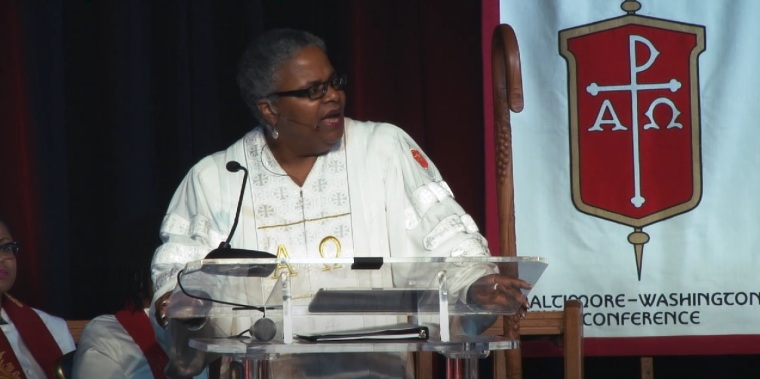23 churches in Maryland, West Virginia can disaffiliate from UMC


Twenty-three congregations near Washington, D.C., have been given the green light to disaffiliate from the United Methodist Church amid the mainline Protestant denomination’s ongoing debate over homosexuality.
At its annual meeting on Thursday, the UMC Baltimore-Washington Conference voted to approve the disaffiliation votes of 23 churches, which are located in the states of Maryland and West Virginia.
The resolution to accept the disaffiliation of the nearly two dozen churches passed overwhelmingly, with 92.3% of conference delegates voting in favor of dismissing the congregations (597 votes). In contrast, only 7.7% (50 votes) were opposed.
Following the vote, Baltimore-Washington Bishop LaTrelle Easterling told those gathered at the meeting that they were moving into “a time of prayer” and “a time of sadness” but also called it “a time of hope.”
“In some ways, this is a failure on all of our parts because we are all supposed to be leaning into the unity of the Body and of the Church,” Easterling stated. “And yet, we are also living into the truth … of where we are.”
Over the past several years, the nation’s second-largest Protestant denomination has been embroiled in a debate over its longstanding Book of Discipline policy prohibiting the blessing of same-sex marriages and the ordination of noncelibate homosexuals.
Although the UMC prohibits both practices, many theologically progressive leaders have actively refused to enforce or follow the rules, prompting many conservative members to consider leaving the denomination.
In the last few years, thousands of congregations nationwide have disaffiliated from the denomination.
The congregations are disaffiliated under the provisions in Paragraph 2553 of the UMC Book of Discipline, which sets out a process for communities to leave the denomination due to its ongoing debate over sexual ethics. Paragraph 2553 is scheduled to expire at the end of the year.
The Baltimore-Washington Conference requires that disaffiliating churches pay 50% of the tax-assessed property value to keep their church properties. Rev. Sheridan Allmond, a member of the conference board of trustees, said that the aggregate total in property tax payments the conference would receive from the 23 churches would be around $10.8 million.
Rev. Kevin Baker, the senior pastor of Oakdale Church in Olney, Maryland, said his church is responsible for paying nearly half the $10.8 million aggregate total of the 23 churches.
He pushed back against the bishop’s previous assertions that “racism” might be behind some of the desire to disaffiliate. Baker submitted a motion that the $10.8 million the conference receives in property payments should benefit African-American-majority churches.
“In one of your statements addressing the conference, you said that you believed racism was behind some disaffiliation. We want to make sure that no one thinks racism is involved in this,” he said. “So, we think profiting to the African American, or historically African American churches, would show our goodwill, that we have no ill will towards anyone as we seek to disaffiliate from the United Methodist Church.”
Baker’s motion was dismissed by Easterling, saying the UMC policy allows the conference board of trustees to set the conference’s disaffiliation requirements and doesn’t allow the annual meeting to “try to prescribe how the trustees would go about that process.”
The 23 churches given the right to disaffiliate on Thursday must complete the conference’s disaffiliation requirement by the end of the year.
The conference is dealing with litigation from over three dozen congregations that believe the requirements the meeting set in the dismissal process are unfair for departing churches.
In March, 38 congregations filed suit against the Baltimore-Washington Conference, accusing the regional body of “holding their church buildings and property hostage.”
“Defendants claim Plaintiff Churches’ property is encumbered by an irrevocable trust for the benefit of the UMC, and the only way for Plaintiff Churches to disaffiliate without surrendering the buildings and property that are central to their congregations is by the permission of the UMC and payment of a financial ransom,” the lawsuit claims.
“This position is inconsistent with the decades-long pattern and practice of the UMC to allow local churches to disaffiliate and retain their church property without paying a ransom.”
A Q&A page on the conference website states that the plaintiff churches are not eligible for a disaffiliation vote, saying they “have surrendered the possibility of disaffiliation.”
“Even if the court rejects these lawsuits, disaffiliation is not an option as Para. 2553 is a temporary option that expires this year. The upcoming annual conference session is the only option for ratifying a church’s vote to disaffiliate under Para. 2553,” the regional body added.
According to Allmond, 30 of the 38 churches were previously involved in disaffiliation before the lawsuit.
According to UM News, as of Thursday, nearly 4,000 congregations have left the UMC since last year, with more expected to disaffiliate from the denomination by the end of the year.




